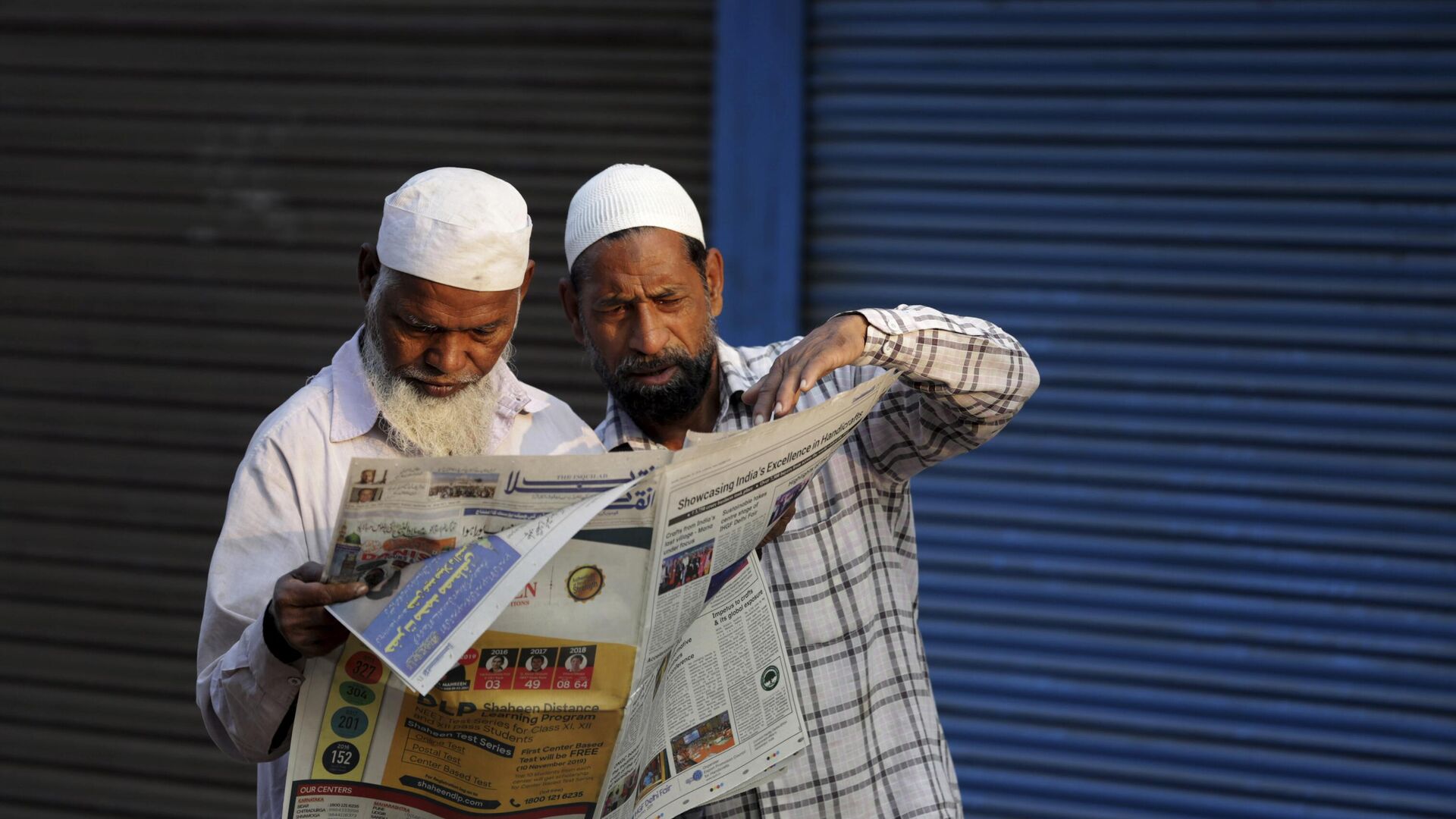https://sputniknews.in/20221214/who-are-pasmanada-muslim-in-india--why-are-they-considered-backward-class-62455.html
Who Are India’s Pasmanada Muslims & Why Are They Considered a Backward Class?
Who Are India’s Pasmanada Muslims & Why Are They Considered a Backward Class?
Sputnik India
Pasmanda is a Persian expression meaning "those left behind" and is a collective term referring to the Ajlaf (backward Muslims) and Arzal (Dalit Muslims) communities in India.
2022-12-14T16:54+0530
2022-12-14T16:54+0530
2022-12-21T17:42+0530
narendra modi
muslim
https://cdn1.img.sputniknews.in/img/07e6/0c/0e/91975_0:171:3031:1876_1920x0_80_0_0_7fcf943bd15e2ffc8f0e0f98112dd3e5.jpg
According to the 2011 Census, the total population of Muslims in India was recorded to be 172.2Mln which is approximately 14 percent of the country's total population, which means that they can be considered a minority.Ever since India gained independence, successive governments have taken certain steps to protect the rights of and provide basic facilities to Indian minorities. However, some of them still lag behind.One such community has been Pasmanda Muslims, whose social standing prime minister Narendra Modi has made it his personal business to improve.Sputnik contacted Yusuf Ansari, a Muslim and Islamic Affairs Specialist and senior journalist, to learn more about Pasmanda Muslims, the possible reasons for their suppression and their needs.In India, Pasmanda Muslims are those who converted from Dalit (oppressed or lowest social class) and backward classes of Hindus, and they make up a large proportion of the country's Muslim population — approximately 80 percent.Why Are Pasmandas Suppressed?After Independence, the elite class of Muslims got representation in politics by joining India's oldest Congress party whereas the lower class Muslims remained on the margins.Since Pasmanda Muslims never got ample opportunity to enter mainstream politics and were left behind in every respect as a result of almost no political representation, their problems were never considered, which according to Ansari, is the major reason for their suppression.The second reason is that Pasmanda Muslims were deprived of facilities under reservation.History Flashback“On 26 January 1950, members of Scheduled Caste (SC), irrespective of their religion, were given reservation according to their population in government jobs, State Assembly and Parliament in accordance with Article 343(1) of the Indian Constitution. But on 10 August 1950, a Presidential Order stated that this would be applicable to members of the Hindu community only. This order ousted all those who had converted from Hindu Dalits to other religions be it Sikhism, Islam, Christianity or any other religion,” Ansari explains.In 1956, renowned Sikh leader Tara Chand and members of the Parsi community told the government that they didn't require any special facilities or special rights for their development. However, he pointed out that the Dalit community were promised their Dalit status would remain intact even if they were to convert to Sikhism. As a result, the then Prime Minister Jawaharlal Nehru reinstated their Dalit status.Then in 1990, when VP Singh became prime minister, recent converts to Buddhism were also given Dalit status. So they also enjoyed the facilities under the reservation. Therefore, only those who got converted into Islam and Christianity were denied the facilities under the reservation. So, they were further deprived of facilities such as free education and many other privileges which led to their suppression.Ansari said that several movements were started to raise the question of Pasmanda Muslims. “In the Nineties, former Rajya Sabha [the parliament's upper house] member Ali Anwar Ansari started the All India Pasmanda Muslim Mahaz to raise the voice of Pasmanda Muslims so that they get their due rights in politics. In addition, several other organizations are working in a similar way,” he added.However, results were not so promising.Ansari said that the main grievance of the Pasmanda Muslims is that they are being ignored by the elites in Indian society.Apart from this, the Pasmanda community has been opposing the demand for religion-based reservation for all Muslims and conducting a caste census, state support for artisans, craftspersons, and agricultural laborers, who are among the most impoverished of Indian Muslims.
Sputnik India
feedback.hindi@sputniknews.com
+74956456601
MIA „Rossiya Segodnya“
2022
Rahul Trivedi
https://cdn1.img.sputniknews.in/img/07e6/0c/13/136500_0:0:628:627_100x100_80_0_0_72097ff894c7446b70d2efafcb719720.jpg
Rahul Trivedi
https://cdn1.img.sputniknews.in/img/07e6/0c/13/136500_0:0:628:627_100x100_80_0_0_72097ff894c7446b70d2efafcb719720.jpg
News
en_IN
Sputnik India
feedback.hindi@sputniknews.com
+74956456601
MIA „Rossiya Segodnya“
Sputnik India
feedback.hindi@sputniknews.com
+74956456601
MIA „Rossiya Segodnya“
Rahul Trivedi
https://cdn1.img.sputniknews.in/img/07e6/0c/13/136500_0:0:628:627_100x100_80_0_0_72097ff894c7446b70d2efafcb719720.jpg
pasmanda muslim, muslim, hindu, dalit, religion, pasmanda muslims in india, religious minorities in india, muslim community in india, backward classes in india, dalit community, sikh leader tara chand, dalit status
pasmanda muslim, muslim, hindu, dalit, religion, pasmanda muslims in india, religious minorities in india, muslim community in india, backward classes in india, dalit community, sikh leader tara chand, dalit status
Who Are India’s Pasmanada Muslims & Why Are They Considered a Backward Class?
16:54 14.12.2022 (Updated: 17:42 21.12.2022) Pasmanda is a Persian expression meaning "those left behind" and is a collective term referring to the Ajlaf (backward Muslims) and Arzal (Dalit Muslims) communities in India. Sputnik tried to find out about their needs and the struggles they face in modern India.
According to the 2011 Census, the total population of Muslims in India was recorded to be 172.2Mln which is approximately 14 percent of the country's total population, which means that they can be considered a minority.
Ever since India gained independence, successive governments have taken certain steps to protect the rights of and provide basic facilities to Indian minorities. However, some of them still lag behind.
One such community has been Pasmanda Muslims, whose social standing prime minister Narendra Modi has made it his personal business to improve.
Sputnik contacted Yusuf Ansari, a Muslim and Islamic Affairs Specialist and senior journalist, to learn more about Pasmanda Muslims, the possible reasons for their suppression and their needs.
“Pasmanda is derived from two Persian words – Pas and Manda. It means the 'ones left behind'. Therefore, the class of Muslims who have been left behind as the test of the country has developed are known as Pasmanda Muslims,” Ansari explained.
In India, Pasmanda Muslims are those who converted from Dalit (oppressed or lowest social class) and backward classes of Hindus, and they make up a large proportion of the country's Muslim population — approximately 80 percent.
Why Are Pasmandas Suppressed?
After Independence, the elite class of Muslims got representation in politics by joining India's oldest Congress party whereas the lower class Muslims remained on the margins.
Since Pasmanda Muslims never got ample opportunity to enter mainstream politics and were left behind in every respect as a result of almost no political representation, their problems were never considered, which according to Ansari, is the major reason for their suppression.
The second reason is that Pasmanda Muslims were deprived of facilities under reservation.
“On 26 January 1950, members of Scheduled Caste (SC), irrespective of their religion, were given reservation according to their population in government jobs, State Assembly and Parliament in accordance with Article 343(1) of the Indian Constitution. But on 10 August 1950, a Presidential Order stated that this would be applicable to members of the Hindu community only. This order ousted all those who had converted from Hindu Dalits to other religions be it Sikhism, Islam, Christianity or any other religion,” Ansari explains.
In 1956, renowned Sikh leader Tara Chand and members of the Parsi community told the government that they didn't require any special facilities or special rights for their development.
However, he pointed out that the Dalit community were promised their Dalit status would remain intact even if they were to convert to Sikhism. As a result, the then Prime Minister Jawaharlal Nehru reinstated their Dalit status.
Then in 1990, when VP Singh became prime minister, recent converts to Buddhism were also given Dalit status. So they also enjoyed the facilities under the reservation. Therefore, only those who got converted into Islam and Christianity were denied the facilities under the reservation. So, they were further deprived of facilities such as free education and many other privileges which led to their suppression.
Ansari said that several movements were started to raise the question of Pasmanda Muslims.
“In the Nineties, former Rajya Sabha [the parliament's upper house] member Ali Anwar Ansari started the All India Pasmanda Muslim Mahaz to raise the voice of Pasmanda Muslims so that they get their due rights in politics. In addition, several other organizations are working in a similar way,” he added.
However, results were not so promising.
Ansari said that the main grievance of the Pasmanda Muslims is that they are being ignored by the elites in Indian society.
“Despite making up the overwhelming majority of Muslims, Pasmandas are under-represented in jobs, legislatures and government-run minority institutions, as well as in organizations run by the community, according to their population,” he pointed out.
Apart from this, the Pasmanda community has been opposing the demand for religion-based reservation for all Muslims and conducting a caste census, state support for artisans, craftspersons, and agricultural laborers, who are among the most impoverished of Indian Muslims.
Ansari feels that the focus of the government on Pasmanda Muslims is a positive sign; however, it has yet to be seen whether this goodwill doesn’t turn into another political gimmick used by opposing parties.


